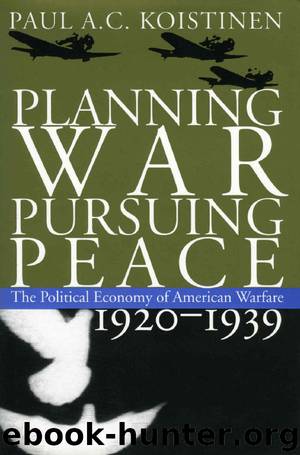Planning War, Pursuing Peace: The Political Economy of American Warfare, 1920-1939 (Modern War Studies) by Paul A. C. Koistinen

Author:Paul A. C. Koistinen [Koistinen, Paul A. C.]
Language: eng
Format: epub
Publisher: University Press of Kansas
Published: 2016-10-29T06:00:00+00:00
THE WAR POLICIES COMMISSION: HEARINGS
The energy and effort devoted to the economics of warfare in the 1920s ultimately produced the War Policies Commission in 1930—which constituted until then the most detailed consideration of economic mobilization for war ever undertaken in America during peacetime. The commission resulted from the American Legion’s switching tactics, and the War Department’s following suit. Until 1928 the legion had supported both the Capper-Johnson bill and Cong. John J. McSwain’s joint resolution, though preferring the former. In 1928 Legion leaders made war economics their first priority. That led legionnaires in Congress to decide in 1929 that although they could not get a bill passed on the issue they could get a commission formed to study it. Even establishing the commission required full unity in Congress. McSwain, who had been sponsoring the call for a commission since 1922, allowed a Republican to lead the effort so as to further the chances of success. After an aborted effort in 1929, the goal was finally achieved in 1930 with the so-called Snell resolution (for Cong. Bertrand H. Snell, R-NY).20
Creating a commission was not easy. The Snell resolution was amended eleven times in the House and twice in the Senate before ratification. One of the major amendments in the House, authored by George Huddleston (D-AL), forbade the commission from considering the conscription of labor. It was probably intended to protect workers against “work or fight,” “national service,” and other forms of compulsion since they lacked the constitutional protection of property under the Fifth Amendment.21
The Snell resolution mirrored the contradictions always involved in the movement for a universal draft. As some observers suggested, the investigating body created under it should have been called the Universal Mobilization Commission, not the War Policies Commission (WPC). To compound the irony, the resolution creating the WPC declared that it was intended “to promote peace.”22
The WPC consisted of the secretaries of war, navy, agriculture, commerce, and labor, the attorney general, and four members from each house of Congress. These public officials were to study amending the Constitution so that private property could be taken for public use by congressional action during war. They were also to consider “methods of equalizing the burdens and to remove the profits of war, together with a study of policies to be pursued in event of War.” Congress did not intend the commission to be a high-powered body, despite its prominent membership. It had no subpoena power, and its funding was minimal. Office space and clerical assistance came principally from the War Department.23
In its day-to-day operations, the War Policies Commission was largely a War Department affair. The department not only provided the commission with its basic needs but also with its leadership. Secretary of War Patrick J. Hurley was elected chairman. He was among the most dynamic of the secretaries of war during the interwar years, and he had served as assistant secretary before being appointed head of the War Department in December 1929. The department also played a leading role in selecting the commission’s executive secretary, Robert H.
Download
This site does not store any files on its server. We only index and link to content provided by other sites. Please contact the content providers to delete copyright contents if any and email us, we'll remove relevant links or contents immediately.
| Anthropology | Archaeology |
| Philosophy | Politics & Government |
| Social Sciences | Sociology |
| Women's Studies |
The Secret History by Donna Tartt(19023)
The Social Justice Warrior Handbook by Lisa De Pasquale(12182)
Thirteen Reasons Why by Jay Asher(8882)
This Is How You Lose Her by Junot Diaz(6869)
Weapons of Math Destruction by Cathy O'Neil(6260)
Zero to One by Peter Thiel(5782)
Beartown by Fredrik Backman(5729)
The Myth of the Strong Leader by Archie Brown(5491)
The Fire Next Time by James Baldwin(5421)
How Democracies Die by Steven Levitsky & Daniel Ziblatt(5209)
Promise Me, Dad by Joe Biden(5139)
Stone's Rules by Roger Stone(5078)
A Higher Loyalty: Truth, Lies, and Leadership by James Comey(4945)
100 Deadly Skills by Clint Emerson(4910)
Rise and Kill First by Ronen Bergman(4772)
Secrecy World by Jake Bernstein(4736)
The David Icke Guide to the Global Conspiracy (and how to end it) by David Icke(4696)
The Farm by Tom Rob Smith(4500)
The Doomsday Machine by Daniel Ellsberg(4480)
